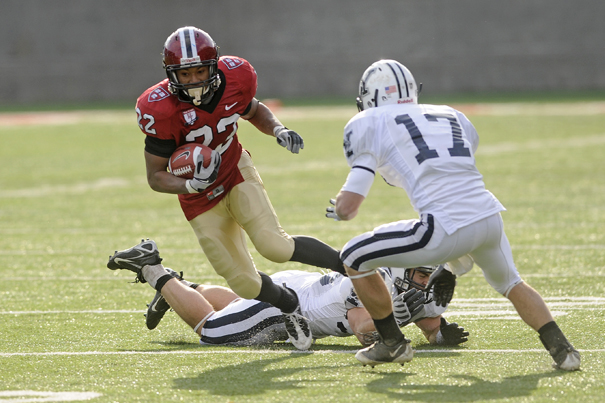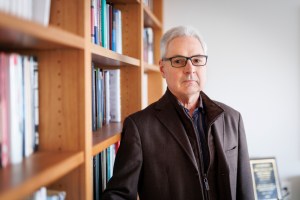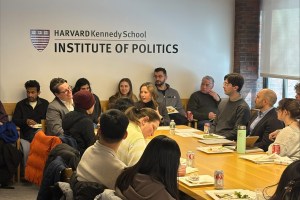Campus & Community
-

Of different faiths, but connected by belief
Community members gather to explore identity, spiritual experience at first ‘Across This Table’ interfaith dinner
-

Batman returns — to accept his Pudding Pot
Michael Keaton feted as Hasty Pudding’s Man of the Year, 30 years after first invite
-
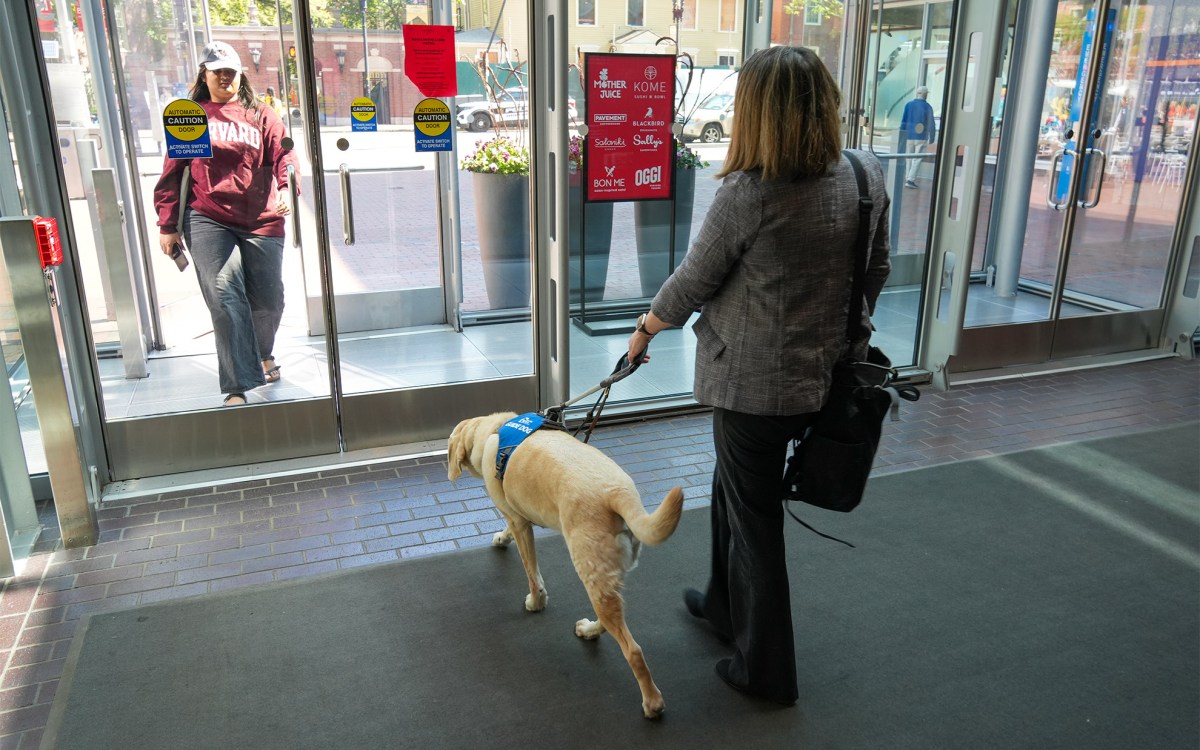
Funding innovative approaches to belonging
Supported by grants from the Culture Lab, four projects aim to strengthen belonging through listening, discussion, art, and representation
-

Class of 2001 elects Alejandra Casillas as chief marshal of alumni
Physician and health equity leader to serve in time-honored role
-

A second shot at Olympic glory
Battle-tested current, former students return to Winter Games
-

Journey on ice and water
Former figure skating star Caitlyn Kukulowicz still hits the triple lutz but has found new place at boathouse
-
Julius Benjamin Richmond
Julius Benjamin Richmond, M.D., Professor of Health Policy, Emeritus in the Faculty of Medicine was born in Chicago, the son of Russian Jewish immigrants, on 26 September, 1916. He died at his home in Brookline, MA on 27 July, 2008. Few individuals have had as great an impact on health, health care, and the well-being of children. He left us all a rich legacy.
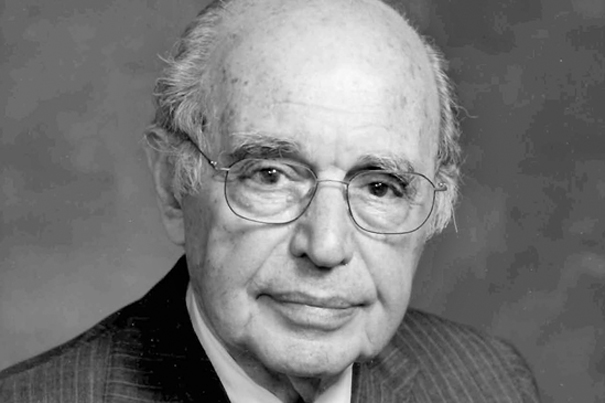
-
Renowned HMS cardiologist Donald Baim dies at 60
Donald Baim, renowned cardiologist, medical device executive, and former Harvard Medical School professor, died on Nov. 6 at the age of 60.
-
Around the Schools: School of Engineering & Applied Sciences
A team of Harvard students has won the grand prize in AT&T’s Big Mobile On Campus Challenge, a national higher-education contest to develop mobile communications platforms.
-
Lorsch recognized by Directorship magazine
Jay Lorsch, the Louis E. Kirstein Professor of Human Relations at Harvard Business School (HBS), was named to Directorship magazine’s Corporate Governance Hall of Fame.
-
Around the Schools: Harvard Business School
This winter, Guhan Subramanian will publish “Negotiauctions: New Dealmaking Strategies for a Competitive Marketplace,” a book that draws on his experience studying and advising on complex corporate transactions and high-stakes personal ones, such as buying a home or car.
-
Women’s soccer claim Ivy title
The Harvard women’s soccer team clinched a share of its second consecutive Ivy League Championship on Oct. 31, and with it an automatic bid to the NCAA tournament. But after punching a ticket to the postseason, the Crimson took care of some unfinished business on Nov. 7, claiming the title outright with a 2-1 overtime triumph at Columbia.
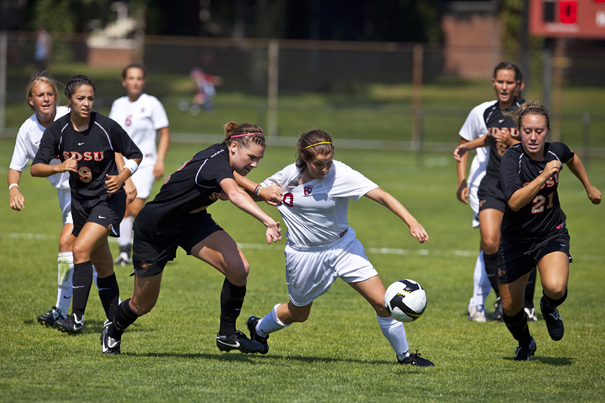
-
Around the Schools: Harvard Law School
GQ Magazine has named Elizabeth Warren, Leo Gottlieb Professor of Law, to its 2009 list of the “50 Most Powerful People in D.C.”
-
Costume Catwalk
It’s a Harvard tradition for a group of freshmen to be named to the First-Year Social Committee (FYSC). The FYSC plans special events throughout the year. This fall, the group hosted the annual Costume Catwalk Oct. 30. Described as an opportunity for freshmen to “schmooze with Dean Dingman,” the event elicited comments as varied as the costumes.
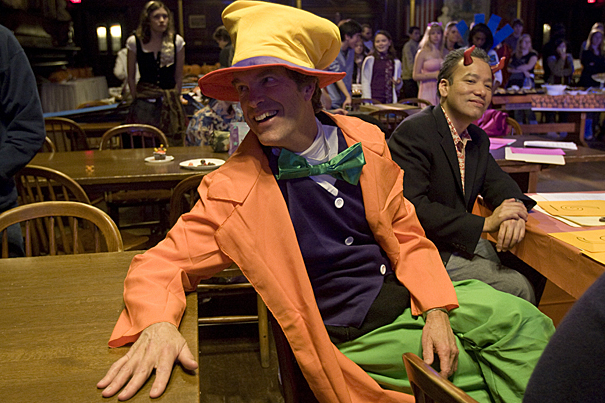
-
Food for thought, and testing
Health and safety ninja Valerie Nelson makes sure campus meals are safe.
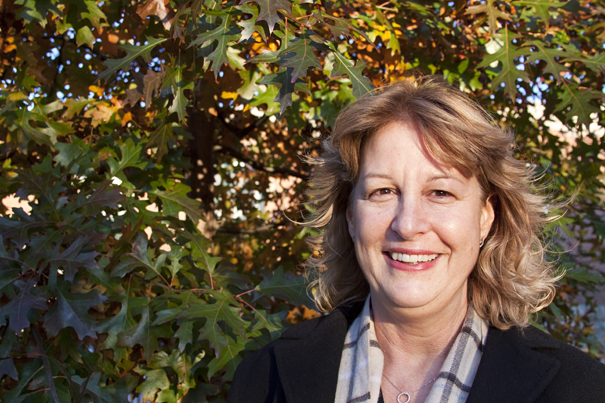
-
Crimson get weekend split
After No. 2 Clarkson handed the Harvard women’s hockey team its second defeat of the season Nov. 6 by a score of 2-1, the No. 10-ranked Crimson picked themselves up and responded forcefully Nov. 7 with a 3-0 shutout of No. 7 St. Lawrence for the Crimson’ 500th win in the program’s history.
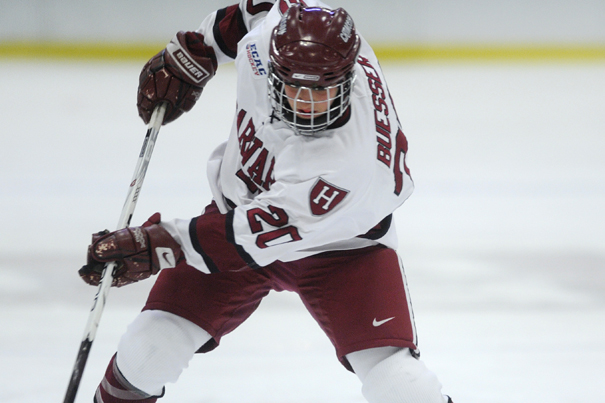
-
New learning space opens in Lamont
Lamont Library recently opened Collaborative Learning Space, an innovative learning space designed to foster collaboration and bring a new level of flexibility to library instruction.
-
Crimson prepare for Penn showdown
After the Crimson’s 34-14 victory over Columbia on Nov. 7, only one obstacle still stands in the way of the Harvard football team’s third consecutive Ivy League Championship. That obstacle resides in Philadelphia.

-
Harvard historian sees banks, China dragging down U.S.
Harvard economic historian Niall Ferguson, whose “The Ascent of Money” book and TV series traced the world’s financial system, last night painted a pessimistic prognosis for U.S. recovery unless the government takes decisive action.
-
Q&A: Josh Lerner on Innovation’s Role in the Economy
His book “The Money of Invention” examined the role of venture capital. “Innovation and Its Discontents,” cowritten with Adam Jaff, looked at how changes in intellectual property have hurt the process of innovation. His new book, “Boulevard of Broken Dreams,” examines why public efforts to boost entrepreneurial innovation so often comes up short…
-
Faculty diversity on the rise
Harvard University has made steady progress toward a more diverse faculty and the numbers of women and minority members stand at all-time highs, according to the annual report of the Office of Faculty Development and Diversity (FD&D).
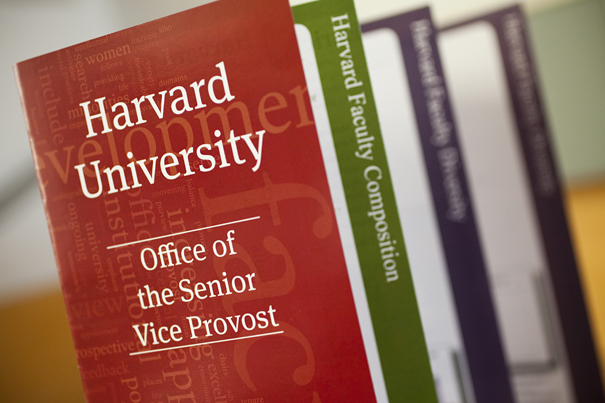
-
Sullenberger receives Harvard Foundation Humanitarian Award
For safely landing US Airways Flight 1549 on the Hudson River and saving the lives of his passengers, the Harvard Foundation will present the Peter J. Gomes Humanitarian Award to skillful pilot and airline safety expert Chesley Sullenberger on Nov. 11 at Memorial Church at 6 p.m.
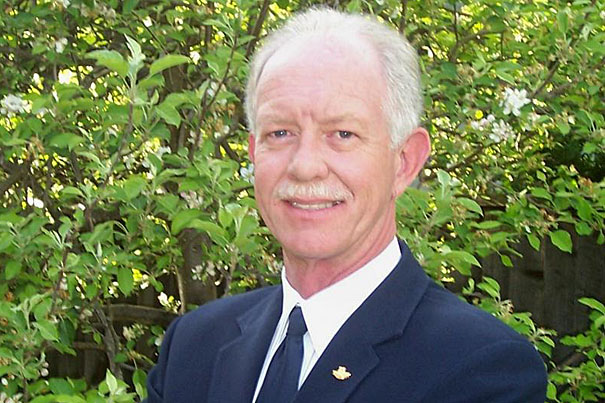
-
Hub lab writing the book on face-reading
Pity the Boston car salesman who negotiated across the table from Charles A. Nelson III, a Harvard neuroscience professor who runs the nation’s top laboratory studying how people learn to decode facial expressions…
-
A Dream Interpretation: Tuneups for the Brain
In a paper published last month in the journal Nature Reviews Neuroscience, Dr. J. Allan Hobson, a psychiatrist and longtime sleep researcher at Harvard, argues that the main function of rapid-eye-movement sleep, or REM, when most dreaming occurs, is physiological…
-
Harvard, Yale Back Students in Patent Stance That Aids Poor
Nov. 9 (Bloomberg) — Harvard University, Yale University and three other schools are pledging to encourage companies to give poor countries better access to drugs and medical products based on…
-
Iraq latest crucible for Harvard mediation
Dispute resolution programs now offer master’s and even doctoral degrees at some campuses, among them the University of Massachusetts at Boston, MIT, Tufts, and Brandeis. The Program on Negotiation at Harvard Law School is a renowned source of expertise in the field….
-
Harvard vs. Dartmouth – Men’s soccer
What does Harvard bring to the field against Dartmouth following a devastating overtime loss to Princeton?
-
Faculty Council meeting held Nov. 4
At its fifth meeting of the year (Nov. 4), the Faculty Council discussed changes to the protocol regarding the use of human subjects in research and a proposal regarding the…
-
Public’s view of health care overhaul has familiar ring
WASHINGTON – Americans’ opinion of the health care proposals now before Congress is eerily similar to public sentiment about the Clinton health reform initiatives in 1994, according to an analysis published online yesterday in The New England Journal of Medicine – and that may not bode well for Democrats…
-
A day in the life of President Faust
A university president’s day is packed with public presentations, private meetings, and a steady stream of phone calls and visitors. A photo essay chronicles one day on President Faust’s schedule, from dawn till dusk.
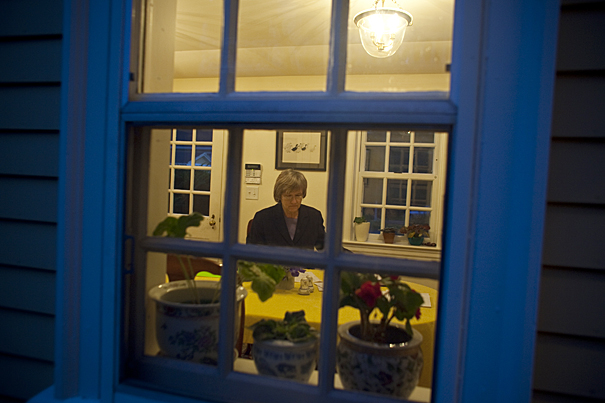
-
Darrel B. Hoff dies at 76
Darrel B. Hoff, 76, who taught at the Harvard-Smithsonian Center for Astrophysics for six years, died on Nov. 2 at the Winneshiek Medical Center in Decorah, Iowa.
-
Alex Killorn named ECAC Hockey Player of the Week
Alex Killorn ’12 was named the ECAC player of the week on Nov. 2 after notching two goals and an assist in the Crimson’s 5-3 victory over Dartmouth on Oct. 30.
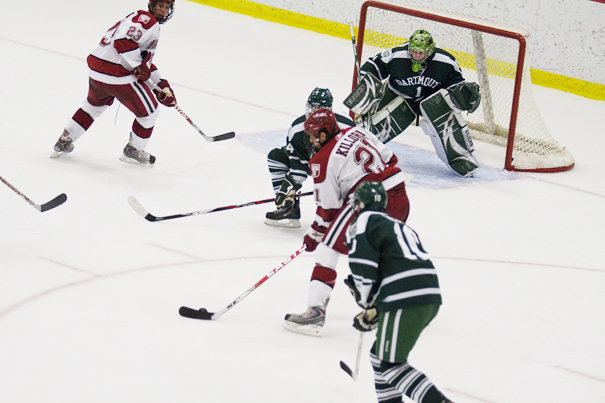
-
Kuss Middle School students learn about astronomy in science program
Fall River — An extended day program at Matthew J. Kuss Middle School has a group of students shooting for the stars. On Oct. 21, science teachers Sarah Chapin and Sandy Sullivan brought 26 students from their Astronomy 2 class to Harvard University to learn about a robotic telescope they are able to control from school…
-
In fight over credit rules, she wields a plan
CAMBRIDGE – Her critics portray her as an ivory tower elitist intent on disrupting the American Dream. But to her legions of fans in the Democratic Party, Harvard law professor Elizabeth Warren is the nation’s leading economic David, fighting to protect middle-class families from corporate Goliaths…
-
Crimson rally against Dartmouth to clinch share of Ivy title
Junior Katherine Sheeleigh scored two goals including the game-winning tally in the 87th minute on Oct. 31 to lead the Harvard women’s soccer team to a 2-1 win over Dartmouth. With the win, the Crimson earn at least a share of the Ivy League title and the automatic bid to the NCAA Championships.
-
Football pounds Dartmouth, 42-21
For a second straight season, Harvard’s offensive line and running backs dictated play as the Crimson collected 315 yards via the ground en route to a 42-21 whitewashing of Dartmouth at Harvard Stadium on Saturday (Oct. 31).
